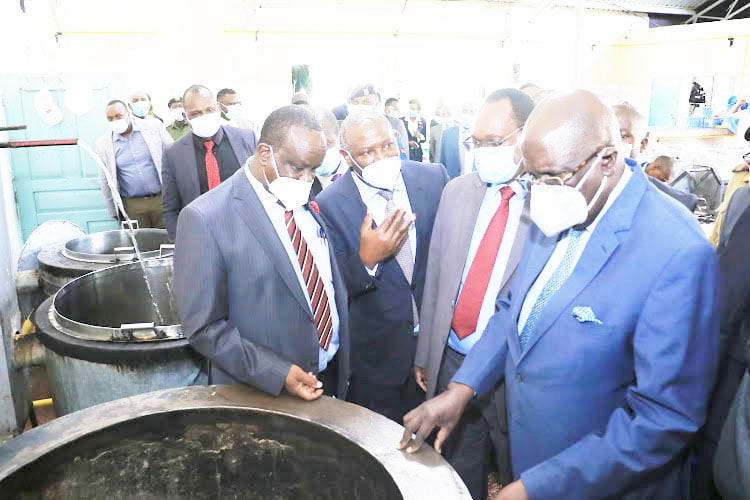By Roy Hezron
Prof. Magoha at Alliance Photo caption Education CS Prof. George Magoha (right), Environment PS Dr. Chris Kiptoo (2nd right) and Equity Group MD and CEO Dr. James Mwangi (3rd right) are taken through the kitchen fitted with modern cooking technology by Alliance High School Principal William Mwangi. Photo | EQUITY BANK
Equity bank has called upon all learning institutions to embrace cleaner, sustainable and environmental sources of cooking and lighting instead of depending on the wood-fuel based cooking which is costly and contributes to environmental pollution.
The initiative, which is dubbed as ‘Clean Cooking Project’, is aimed at supporting learning institutions in the installation of environmentally safe modern technologies for cooking such as steam-based cooking, biofuels, sustainable biomass and Liquid Petroleum Gas (LPG).
In an interview with Education News in his office, Equity Group Foundation’s Energy and Environment Associate Director Mr. Eric Naivasha stated that learning institutions could save up to 40 percent of their entire cooking budget if they transformed to clean energy. The move will also help in conserving the environment.
The clean cooking project initiative which has been rolled out by the bank in partnership with Liquefied Petroleum Gas (LPG) firm is billed to help learning institutions cut their fuel costs by nearly 40 per cent.
The project will see Equity Bank finance learning institutions in order to buy the necessary equipment as well as meet the attendant installation costs.
Naivasha stated that schools can start repaying the loans from the savings they realize after switching to cleaner energy.
The loan, which targets both private and public schools and any other learning institutions that has a kitchen, is tabulated based on the size of the institution, the population and the number of meals prepared in the institution.
According to data from the ministry of Education, there are about 10,000 secondary schools in Kenya. These learning institutions, especially those offering boarding facilities, spend a significant percentage of their annual budget on wood fuel for cooking.
“We have found that most schools have cows. We also do biogas for schools so that they are able to utilize the waste of animals to create energy for cooking. It’s very efficient because once you install the bio-digester, you just feed in, get your gas and continue with cooking,” added Naivasha.
According to the Clean Cooking Alliance of Kenya (CCAK) study on ‘Use of Biomass Cook-stoves and Fuels in institutions in Kenya report of 2018’, 97 per cent of primary and secondary schools use firewood derived from forests as cooking fuel and this counters the government’s efforts of attaining 10 per cent forest cover.
CCAK estimates that one million metric tonnes of wood-fuel are used by primary and secondary schools every year with a value of Kshs 10 billion.
The increased over-reliance on wood and charcoal as the primary sources of fuel by institutions requires urgent attention for the country to reduce greenhouse gas emissions by 30 per cent by the year 2030 under the Intended Nationally Determined Contribution (INDC).
“Wood will never be a sustainable source of fuel because the rate at which we are cutting trees for firewood is not the same as the rate at which we’re growing trees,” stated Naivasha.
Alliance High School is the first school to welcome the clean energy. Cabinet Secretary in the Ministry of Education Prof. George Magoha presided over the launch of the initiative together with Equity Group Managing Director and Chief Executive Officer (CEO) Dr. James Mwangi on March 8, 2021.
“Alliance High School has traditionally used wood for cooking. With the installation of clean cooking infrastructure, the school can now reap the benefits of cleaner and environmentally friendly cooking solutions. This is a project that is transformative and in line with the government’s agenda,” said Prof. Magoha during the launch of the initiative at Alliance High School.
Prof. Magoha called on all schools in the country to transform to use of clean energy and save on costs and improve health.
Dr. Mwangi stated that lack of appropriate financing and innovative technologies are major barriers to clean transition.
“Lack of appropriate financing and innovative technologies have been the biggest barriers to clean energy transition. To close this gap, we have decided to partner with learning institutions to install more environmentally friendly cooking and lighting facilities,” said Dr. Mwangi.
Last year, Equity committed to planting 35 million trees to contribute and rally the country towards the achievement of 10 per cent forest cover.
Out of the 35 million trees, Equity intends to plant 20 million in learning institutions. So far, it has planted 3.2 million trees, 2 million of which have been planted in 2,133 schools across the country.
About 780,000 households and businesses have been supported to access clean energy products including solar panels for lighting and heating in homes, schools and hotels.






